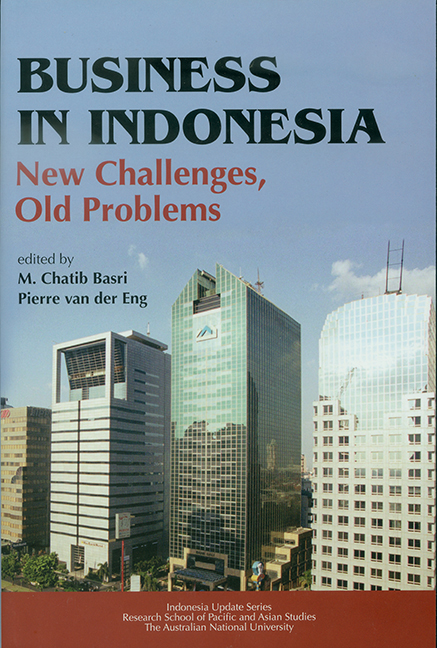Book contents
- Frontmatter
- Contents
- Tables
- Figures
- Contributors
- Acknowledgments
- Glossary
- 1 Business in Indonesia: Old Problems and New Challenges
- PART I Political and Economic Developments
- PART II Overview of the Business Environment
- PART III Foreign Investment and Trade
- PART IV Key Issues in the Business Environment
- 8 The Effects of Decentralisation on Business in Indonesia
- 9 Political Economy of Privatisation of State-owned Enterprises in Indonesia
- 10 Corporate Ownership and Management in Indonesia: Does It Change?
- 11 Tinkering Around the Edges: Inadequacy of Corporate Governance Reform in Post-Crisis Indonesia
- 12 Upholding Indonesian Bankruptcy Legislation
- 13 The Private Sector Response to Public Sector Corruption
- 14 A Challenge for Business? Developments in Indonesian Trade Unionism after Soeharto
- 15 Labour Regulation and the Business Environment: Time to Take Stock
- References
- Index
- Indonesia Update Series
15 - Labour Regulation and the Business Environment: Time to Take Stock
from PART IV - Key Issues in the Business Environment
Published online by Cambridge University Press: 21 October 2015
- Frontmatter
- Contents
- Tables
- Figures
- Contributors
- Acknowledgments
- Glossary
- 1 Business in Indonesia: Old Problems and New Challenges
- PART I Political and Economic Developments
- PART II Overview of the Business Environment
- PART III Foreign Investment and Trade
- PART IV Key Issues in the Business Environment
- 8 The Effects of Decentralisation on Business in Indonesia
- 9 Political Economy of Privatisation of State-owned Enterprises in Indonesia
- 10 Corporate Ownership and Management in Indonesia: Does It Change?
- 11 Tinkering Around the Edges: Inadequacy of Corporate Governance Reform in Post-Crisis Indonesia
- 12 Upholding Indonesian Bankruptcy Legislation
- 13 The Private Sector Response to Public Sector Corruption
- 14 A Challenge for Business? Developments in Indonesian Trade Unionism after Soeharto
- 15 Labour Regulation and the Business Environment: Time to Take Stock
- References
- Index
- Indonesia Update Series
Summary
Extraordinarily rapid change in the regulatory and institutional environment for labour in Indonesia over the past six years has sought to redress the balance in labour policies and process in favour of workers. Many of the changes that occurred were based on the premise that business was too strongly favoured, and labour heavily penalised, in labour policy and its implementation under former President Soeharto. Some were long overdue as a result of the policy freeze in the last years of the New Order, especially in the areas of industrial relations and labour rights.
These far-reaching changes will inevitably have an impact on business, and indeed many businesses have complained about the onerous nature of new regulations and laws. In this chapter, I examine the potential benefits and costs to business, especially the impact on productivity, costs and competitiveness. I also look at likely implications for workers, since their situation is inevitably affected by changes in the business climate. For labour, there are two critical issues: whether improvements in wages and security, through regulation, outweigh the costs of potential job losses, and who gains and who loses from the new laws. In brief, I argue that it is time to take stock of some of the implications of the new environment in which business and labour now operate.
I suggest some important general considerations in the following section before turning to the historical and institutional context in the third section. I then deal in some detail with three aspects of labour reform and policy: minimum wages; dismissals and severance pay; and contract labour and outsourcing.
LABOUR STANDARDS: SOME GENERAL CONSIDERATIONS
What are labour standards, and how do they influence the business environment? Labour standards cover a wide range of issues, from labour protection (the regulation of wages and working conditions) to industrial relations, overseas workers, vocational training and manpower planning. This chapter focuses on labour protection or labour standards, which are typically regulated through minimum standards legislation or collective bargaining in enterprises and industries, or commonly through a combination of both. Labour protection legislation covers a wide range of subjects, such as minimum wages, hours of work, discrimination, employment of child labour, retrenchments and severance pay, contract workers, safety and health. I focus on several of these issues in this chapter, while recognising that all are important for business decisions and the welfare of workers.
- Type
- Chapter
- Information
- Business in IndonesiaNew Challenges, Old Problems, pp. 234 - 250Publisher: ISEAS–Yusof Ishak InstitutePrint publication year: 2004

